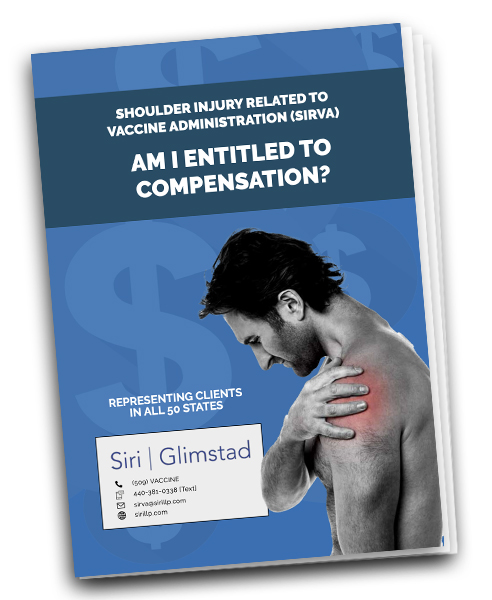VACCINE INJURY:
SIRVA
(Shoulder Injury Related to Vaccine Administration)
No cost for representation! We represent clients in all 50 states.
1-509-VACCINE (822-2463)
Act now. Injury cases must be filed within 3 years! Death cases within 2 years!

What is SIRVA?
Most people living in the United States will receive routine vaccines at various times throughout their lives. When you get a vaccine, it is common to feel a mild arm soreness and stiffness that lasts for a few days. If you receive vaccines regularly, you have probably experienced this yourself.
In some cases these temporary symptoms linger and worsen. Sometimes they worsen until the individual is unable to use their arm and shoulder without intense pain. This vaccine injury pain and limited movement can last for months or years and greatly affect someone’s quality of life. The term for this type of Injury is called SIRVA, short for Shoulder Injury Related to Vaccine Administration.
People afflicted with SIRVA may find it challenging to perform basic activities such as getting dressed, bathing, operating a vehicle or even caring for children. At times, the discomfort from shoulder pain can make it challenging to find a comfortable position in bed and fall asleep.
SIRVA FAQ
What Causes SIRVA?
SIRVA injuries result when a vaccine is administered in the incorrect part of the deltoid muscle. When the vaccine is given too high, the needle can puncture and inject vaccine fluid into the bursae, which are fluid-filled sacs that protect the tendons in the shoulder. If the vaccine is given too low or too far to the side, the needle can puncture the radial or axillary nerve.
When a vaccine is administered incorrectly, the active components of the vaccine can cause an inflammatory response to occur that results in injury to the area injected. SIRVA is not an individual diagnosis, but a collective name for the many types of shoulder injuries that can occur from receiving a vaccine. Some of the more common SIRVA injuries include bursitis, tendinitis, adhesive capsulitis and rotator cuff tear.
How do I know if I have a SIRVA injury?
The most common and earliest symptom of a SIRVA injury is severe shoulder pain that begins within 48 hours of receiving a vaccine. SIRVA injuries affect the part of the shoulder that allows you to move your arm comfortably.
Therefore, your pain is likely to be more intense when you use your shoulder, such as when you reach overhead or across your body. A SIRVA injury can also interfere with your sleep.
Stiffness or Decreased Range of Motion
You may have difficulty moving your arm while trying to perform basic tasks, like bathing, getting dressed, or folding laundry. Performing these tasks may be painful or impossible without assistance.
Weakness or Loss of Strength
You may not be able to lift items that you once could or put any weight on your arm.
Swelling or Redness at Injection Site – You may experience swelling at the injection site and/or it may be painful to the touch.
Arm Pain
Some people may experience radiating arm pain, especially if the vaccine was administered too low or too far to the side.
If you are experiencing any of these symptoms following a vaccination, you should contact your doctor immediately to discuss your treatment options. If left untreated, many of these conditions become progressively worse.
What if I am experiencing SIRVA symptoms?
You should make sure to inform your healthcare provider that the symptoms started after a vaccine was administered.
Your treating provider should perform a physical examination on the affected area. Additional tests may be ordered including an x-ray and/or specialized diagnostic testing such as MRI/ultrasound. The provider may recommend physical therapy or refer you to specialized physician.
How are SIRVA injuries diagnosed?
When you see your doctor for SIRVA symptoms, you will likely not be diagnosed as having “SIRVA.” SIRVA is a term used to explain how these injuries are caused and not the injuries themselves. People who have a vaccine-related shoulder injury are most often diagnosed with the following medical conditions:
Frozen Shoulder Syndrome (Adhesive Capsulitis):
This condition causes pain and stiffness in your shoulder joint that starts out gradually and progressively worsens. Frozen shoulder typically resolves within 1-3 years. Treatment typically includes physical therapy and steroid injections. In some cases, surgery may be necessary.
Shoulder Bursitis:
This condition causes pain and inflammation of the bursa, the fluid-filled sacs that lubricate the shoulder joint and allow the arm to move with ease. Shoulder bursitis is a temporary condition, but it may last for many months.
Treatment typically includes steroid injections, pain medication, and immobilization with a splint. In some cases, surgery may be necessary.
Shoulder Tendinitis:
This condition causes pain and inflammation in the rotator cuff or biceps tendon. Signs of tendinitis are pain and tenderness in your shoulder and the inability to hold your arm in certain positions. Treatment typically includes anti-inflammatories, steroid injections, physical therapy, and ultrasound therapy. In some cases, surgery may be necessary.
Rotator Cuff Injury:
If a misplaced vaccine causes inflammation in the shoulder joint, a rotator cuff tear can occur. This condition is often accompanied by bursitis and tendonitis. Treatment typically includes physical therapy, steroid injections, and often surgery is necessary to relieve the pain and symptoms from this type of injury.
Impingement Syndrome (Swimmer’s Shoulder)
This condition occurs when an inflamed tendon in your shoulder rubs against your shoulder blade, causing pain. It can occur when a vaccine is injected too high in your shoulder. Symptoms are similar to the above listed conditions, with muscle weakness, shoulder pain, and limited range of motion. Treatment typically includes steroid injections and physical therapy. In rare cases, surgery may be required to relieve the pain and symptoms from this type of injury.
What are common treatments for SIRVA?
Physical Therapy
Physical therapy may help you regain strength and range of motion in your arm and shoulder as your injury heals.
Home Exercise Program (HEP)
A home exercise program (HEP) should only be used when you have been given this instruction by your doctor. Most of the time, individuals in physical therapy are provided with exercises to continue while at home.
Steroid Injections
Steroid injections are commonly used to treat SIRVA injuries as they can help to reduce inflammation in the affected part of the arm. Steroid injections can be effective pain-relief treatments, but relief is often temporary, and several injections may be required.
Pain Medication
Your doctor may prescribe over-the-counter anti-inflammatories and pain relief medications or in some cases, prescription pain medication may be necessary to manage symptoms.
Platelet-Rich Plasma Injections (PRP)
PRP injections are a relatively new treatment that utilizes your body’s own blood cells to accelerate the natural internal healing process. PRP injections have been shown to be especially effective at treating tendonitis.
Surgery
While many patients obtain optimal relief with non-invasive treatments, in some cases, surgery is necessary for treatment of SIRVA injuries. Surgeries are typically performed in cases of rotator cuff tears, impingement syndrome, and frozen shoulder syndrome.
Are there doctors who treat SIRVA injuries?
Even if your doctor doesn’t believe that your vaccine caused your shoulder injury, your diagnosis and treatment will be the same. As discussed in the next section, you can still have a successful claim in court even if your doctor does not document that you suffered a SIRVA injury.
If you feel that your doctor’s reluctance to recognize your SIRVA injury is interfering with your treatment, you have the option to get a second opinion from another doctor. Depending on where you live, we may be able to connect you with a doctor in your area who has experience treating SIRVA injuries.
Can I receive compensation for my SIRVA injury
What is the National Vaccine Injury Compensation Program (VICP)?
What are the VICP eligibility requirements?
In order to be eligible to file a claim in the VICP, the vaccine administered must be one that is listed on the “Vaccine Injury Table.” While most of the common vaccines are listed on the Vaccine Injury Table there are several vaccines that are not listed so it is important to make sure the vaccine is covered prior to filing a claim in the VICP. (See the list of covered vaccines below). United States citizenship is not required to bring a claim under the VICP, however, the injured person must have either (1) received the vaccine in the United States; (2) been a United States citizen serving abroad for the armed forces or other United States governmental entity; or (3) the company that manufactured the vaccine was in the United States, and the injured person returned within six months from receiving the vaccine to the United States.
Covered Vaccines
Your SIRVA injury may qualify you for a monetary award. If your SIRVA injury is the result of one of the vaccinations listed below, you may be eligible to file a petition for compensation in the Vaccine Injury Compensation Program (“VICP”):
- Influenza vaccine (flu shot)
- DTaP/DTP/DT/Td/TT/P/DTP-Hib
- Hepatitis A vaccine
- Hepatitis B vaccine
- MMR/MMRV vaccine
- Polio vaccine (IPV)
- Varicella (Chicken Pox) vaccine
- Haemophiles influenza type B (Hib) vaccine
- Pneumococcal vaccine (PCV-13 only)
- Meningococcal vaccine
- Human Papilloma Virus (HPV)
You may also be eligible to file a petition in the VICP if you received a vaccine on this list and a vaccine that is not on this list and both vaccines were administered into the same arm. If you are injured by a vaccine that is not on this list, you may still be able to file a claim in state or federal court.
** https://www.uscfc.uscourts.gov/vaccine-programoffice-special-masters
** http://hrsa.gov/sites/default/files/vaccinecompensation/vaccineinjurytable.pdf
What is the difference between table injury and off-table injury?
When an individual receives a vaccine that is listed on the Vaccine Injury Table but suffers from an injury not listed on the table (or suffers from an injury listed on the Vaccine Injury Table but outside of the specified time period on the Vaccine Injury Table for that particular injury), the case is considered to be an Off-Table Injury. An Off-Table Injury case is one where the individual will have to prove that the vaccine caused the injury.
Proving vaccine injury causation typically requires retaining experts to discuss the medical theory as to how the vaccine can cause the injury, explaining how the vaccine caused the injury in the individual’s case, and explaining that the onset of the injury occurred within a medically appropriate timeframe. While not required, medical literature is often used by experts to support their opinions.
With the exception of the oral rotavirus vaccine and the oral polio vaccine, SIRVA is listed on the Vaccine Injury Table as an adverse event that can occur from the administration of every other covered vaccine. In most cases, SIRVA injury cases are Table Injury cases, however, there are plenty of SIRVA cases that fall into the Off-Table Injury category and that have to be proven with expert testimony.
What is the statute of limitations?
Who are the parties involved in a SIRVA case?
What is the court and special masters?
Once the claim process begins, the merits of the claim are primarily based on medical records and testimony from the medical providers, experts and the injured person. There typically is no one document that wins or loses a case. Rather, the Special Master’s decision is based on his or her evaluation of the medical records and testimony of medical experts and other individuals at an entitlement hearing.
The standard of proof to win a case in the VICP is called “preponderance of the evidence,” which means that more likely than not, the vaccine caused the injury. When you or your loved one is the injured party, it seems like it would be easy to see that the vaccine caused your injury but these cases are complex and often not as simple as they may seem.
While the VICP was intended to be a faster, more streamlined process compared to the traditional court setting, it is common for Table Injury claims to take 1-2 years to resolve. On average, Non-Table Injuries take 3 or more years to resolve.
Claims in the VICP can be resolved through settlement agreement where both parties agree on a certain dollar amount to end the dispute and claim process or through a decision from a Special Master after an evidentiary hearing called an entitlement hearing. An entitlement hearing is more akin to traditional litigation where a hearing is held, and testimony is given in front of a Special Master who will issue a ruling on whether the person is entitled to compensation. Other options for claim resolution include alternative dispute resolution such as mediation.
Do I need an attorney?
Contacting an attorney right away helps to ensure that necessary evidence is obtained and preserved, that the claim will be timely filed and that the specific VICP rules and processes are followed. The VICP awards attorneys’ fees and costs as part of the allowable damages in VICP cases so attorneys’ fees and costs do not come out of any award you may receive. While some firms may request that the individual pay costs of the litigation, no firms can ask a client to pay legal fees.
At Siri & Glimstad LLP, we cover all costs of the litigation so there are no legal fees or costs paid by an individual when they retain Siri & Glimstad LLP to represent them in a VICP case.
If you or a loved one is suffering from a SIRVA injury or any other illness or injury that you believe was caused by a vaccine, Siri & Glimstad LLP is here to help. We provide free consultations and no cost representation.
How Siri & Glimstad Can Help
The benefit of having quality legal representation for your vaccine injury case cannot be overstated. Siri & Glimstad, LLP is nationally recognized for its practice in vaccine injury law. We have an entire department of dedicated professionals ready to represent people who have been injured by vaccines. Our curated team is comprised of attorneys and support staff with unique and highly specialized skills that enable us to provide aggressive and competent representation for our clients.
We believe that your relationship with your attorney is just as important to your process as your attorney’s legal skills. If you are reading this, chances are you or someone you love may be enduring one of the most physically and emotionally difficult times in their life. Respect and compassion are fundamental to our practice. We understand that clear and frequent communication are paramount to the client experience. You will have highly personalized, transparent representation with direct access to an attorney during all stages of your case. Every single client is a priority.
If you think you may have a SIRVA injury claim or any other vaccine injury, don’t wait. There are strict deadlines that must be met to preserve your case. Contact Siri & Glimstad LLP today for a free consultation with one of our vaccine injury attorneys.
Download Our SIRVA Booklet
No cost for representation.
We represent clients in all 50 states.
SIRVA References and Links
- Avoiding Shoulder Injury Related to Vaccine Administration, Australian Immunisation Handbook, Australian Government Department of Health, https://immunisationhandbook.health.gov.au/sites/default/files/2021-07/Publication-Avoiding-shoulder-injury-related-to-vaccine-administration.pdf (Accessed August 9, 2022).
- Barnes, Matthew G., et al., A “Needling” Problem: Shoulder Injury Related to Vaccine Administration.” The Journal of the American Board of Family Medicine, vol. 25, no. 6, 1 Nov. 2012, pp. 919–922, 10.3122/jabfm.2012.06.110334. https://www.jabfm.org/content/25/6/919.full (Accessed August 9, 2022)
- Bodor, Marko, et al. “Ultrasonic Aspiration for Vaccination-Related Shoulder Dysfunction.” Heliyon, vol. 7, no. 11, 1 Nov. 2021, www.cell.com/heliyon/fulltext/S2405-8440(21)02545-7, 10.1016/j.heliyon.2021.e08442. https://www.cell.com/heliyon/fulltext/S2405-8440(21)02545-7 (Accessed August 9, 2022)
- Chow, Jacky C. K., et al. “Shoulder Injury Related to SARS-CoV-2 Vaccine Administration.” CMAJ, vol. 194, no. 2, 17 Jan. 2022, pp. E46–E49, www.cmaj.ca/content/194/2/E46, 10.1503/cmaj.211162. https://www.cmaj.ca/content/194/2/E46 (Accessed August 9, 2022)
- Cook, Ian F. “Subdeltoid/Subacromial Bursitis Associated with Influenza Vaccination.” Human Vaccines & Immunotherapeutics, vol. 10, no. 3, 27 Nov. 2013, pp. 605–606, 10.4161/hv.27232.. https://www.ncbi.nlm.nih.gov/pmc/articles/PMC4130290/ (Accessed August 9, 2022)
- Kia C, Baldino J, Bell R, Ramji A, Uyeki C, Mazzocca A. Platelet-Rich Plasma: Review of Current Literature on its Use for Tendon and Ligament Pathology. Curr Rev Musculoskelet Med. 2018 Dec;11(4):566-572. doi: 10.1007/s12178-018-9515-y. PMID: 30203334; PMCID: PMC6220011.
- MacMahon, Aoife, et al. “What Do We Know about Shoulder Injury Related to Vaccine Administration? An Updated Systematic Review.” Clinical Orthopaedics & Related Research, vol. Publish Ahead of Print, 24 Mar. 2022, 10.1097/corr.0000000000002181. https://journals.lww.com/clinorthop/Fulltext/2022/07000/What_Do_We_Know_About_Shoulder_Injury_Related_to.3.aspx?WT.mc_id=HPxADx20100319xMP (Accessed August 9, 2022)
- Macomb, Christopher V, et al. “Treating SIRVA Early with Corticosteroid Injections: A Case Series.” Military Medicine, 17 Oct. 2019 https://academic.oup.com/milmed/article/185/1-2/e298/5588762 (Accessed August 9, 2022)
- Schleihauf, Andrew. “Shoulder Injury Related to Vaccine Administration (SIRVA).” Sports Medicine Review, 29 May 2022, www.sportsmedreview.com/blog/shoulder-injury-related-vaccine-administration/. (Accessed August 9, 2022)
- Shahbaz, Michael, et al. “Shoulder Injury Related to Vaccine Administration (SIRVA): An Occupational Case Report.” Workplace Health & Safety, vol. 67, no. 10, 20 Sept. 2019, pp. 501–505, 10.1177/2165079919875161. https://pubmed.ncbi.nlm.nih.gov/31540569/ (Accessed August 8, 2022)
- “Shoulder Injury Related to Vaccination (SIRVA).” Institute for Vaccine Safety, 6 June 2022, www.vaccinesafety.edu/shoulder-injury-related-to-vaccination-sirva-2/. (Accessed August 8, 2022)
- Zheng, Chengyi, et al. “Identifying Cases of Shoulder Injury Related to Vaccine Administration (SIRVA) in the United States: Development and Validation of a Natural Language Processing Method.” JMIR Public Health and Surveillance, vol. 8, no. 5, 24 May 2022, p. e30426, 10.2196/30426. https://www.ncbi.nlm.nih.gov/pmc/articles/PMC9175103/ (Accessed August 8, 2022)
The contents on this page are for informational purposes only. It is not intended to provide medical or legal advice.











